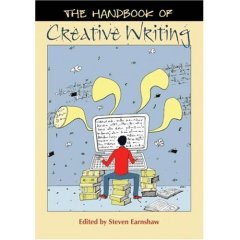Handbook of Creative Writing | Reviews
edited by Steven Earnshaw
Edinburgh University Press
£18.99
|
To buy The Handbook of Creative Writing
'If you are hoping to find out how to write convincing dialogue, how to use punctuation correctly, or where to get some ideas, this really is not the book for you and you would be wasting your money if you were to buy it.'
'However, as it turns out, this is a fascinating and helpful guide, aimed at a particular audience, but one that is a little difficult to define in a few words.'
'Is it possible to practise creative writing as an academic subject? Likewise, is it possible to teach it? To study the business of writing?'
'if you hate taking things at face value, without understanding why they happen the way they do, then this is definitely the book for you.'
'This is a serious handbook for people who approach the business of writing in a particular fashion, for whom simply 'doing' isn't quite enough; it's for people who need to know 'why' as well as 'how'. On that basis, I have no hesitation in recommending it.'
|
Unusually, I will start this review by issuing a caveat. If you are hoping to find out how to write convincing dialogue, how to use punctuation correctly, or where to get some ideas, this really is not the book for you and you would be wasting your money if you were to buy it. Despite the all-encompassing title, it really isn't that kind of book. As to what kind of book, it actually is, that question is a little more difficult to answer. In the introduction, Steven Earnshaw describes the Handbook as being 'aimed primarily at the student embarking on a creative writing programme in Higher Education', which suggests it might be a textbook. Except that he suggests it is a book for tutors too. 'The aim throughout has been to have within the pages of a single book all that you might need as a writer or tutor to further your writing and teaching, and to further your writing career.' In all, the effect is rather off-putting, for potential student and potential tutor alike. The sense is very much that this handbook is endeavouring to please everyone while failing to be of use to anyone, which is not a promising start. However, as it turns out, this is a fascinating and helpful guide, aimed at a particular audience, but one that is a little difficult to define in a few words. It is also, dare I say it, slightly hamstrung in its purpose by the inclusion of 'handbook' in the title. Anyone who has spent time in a university English department in the last ten years will be well aware that courses in creative writing, at undergraduate and postgraduate level, are absolutely the up and coming thing. These days it's a rare institution of higher education that doesn't offer at least one undergraduate module focusing on the practice rather than the theory of writing. Indeed, in some English departments, practical creative writing is seen more and more as a vital tool to used alongside critical theory in studying texts. On the other hand, more than one creative writing student is disturbed to find that he or she is also required, as part of their course, to study literature from a theoretical point of view. It is something they are frequently not prepared for, and just as frequently, they cannot see the point of doing so when all they want to do is to write. At the heart of this book, therefore, is a paradox. Is it possible to practise creative writing as an academic subject? Likewise, is it possible to teach it? To study the business of writing? Should one even try? Needless to say, there is no one clear answer, but I do think this book addresses some of the questions that arise. The book is divided into three sections, of which I think Section One – Writing:Theories and Contexts may prove most contentious to those who just want to get on with it, rather than worrying about the history or the theory. Yet, as the various articles show, there is a lot to be gained from having some sense of where one stands as a writer in the twenty-first century, of being able to appreciate what has gone before and to think about where literature is heading, not to mention how literature has been shaped as much by criticism and theory as by writers simply working. Section Two – The Craft of Writing and Section Three – The Writer's Life – deal more directly with the day-to-day experience of being a writer, but once again the various chapters take a slightly more detached view of their subject: it's not so much 'how to' as 'this is why we …', and philosophical as much as it is practical. It is admittedly not to everyone's taste but if you hate taking things at face value, without understanding why they happen the way they do, then this is definitely the book for you. At the same time, it is still chockful of practical information; it's just that the chapters on various different forms and genres are not cast in the form of 'do this, then do this,' and so on. Indeed, one of the things I find particularly impressive about this handbook is the breadth of its coverage. I cannot think, for example, when I last saw a guide to writing that specifically discussed the business of writing and selling poetry, let alone such things as translation, writing creative non-fiction, and writing as 'therapy'. All this stands alongside more conventional topics like writing for children, writing crime fiction, and so on. The business of being a writer is handled in the same way. The standout chapter here is the most comprehensive account of copyright issues I have ever seen. How to best describe this book? To say it is more 'cerebral', more 'intellectual' is to make it sound unreadable. It isn't, but neither is it a true self-help book, or a 'by numbers' account of how to write and get published. This is a serious handbook for people who approach the business of writing in a particular fashion, for whom simply 'doing' isn't quite enough; it's for people who need to know 'why' as well as 'how'. On that basis, I have no hesitation in recommending it. Reviewed by Maureen Kincaid Speller |
|
|
© Maureen Kincaid Speller 2007 |
Related Items in our Amazon Store
|
List price: £19.99
Publisher: Edinburgh University Press
2007-04-16
Paperback
Sales rank: 548,188
|


 a
a 